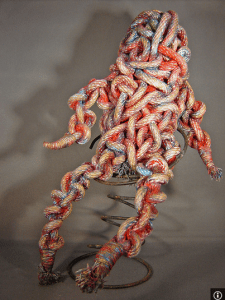 A frequent reader sent me a link recently to a series of YouTube videos from a PBS special describing a body of research exploring the link between stress and human health (HT JG). One of the featured studies is a 30 year field study of a troop of baboons in Kenya led by Professor Robert Sapolsky. You can find a short report of his study in this news release from 2007: Robert Sapolsky discusses physiological effects of stress “We’ve evolved to be smart enough to make ourselves sick.” Prof. Sapolsky has written a number of books including Why Zebras Don’t Get Ulcers, and A Primate’s Memoir: A Neuroscientist’s Unconventional Life Among the Baboons. He is a very productive and well cited researcher. (The picture to the right is of a baboon troop in Tanzania, taken from wikipedia)
A frequent reader sent me a link recently to a series of YouTube videos from a PBS special describing a body of research exploring the link between stress and human health (HT JG). One of the featured studies is a 30 year field study of a troop of baboons in Kenya led by Professor Robert Sapolsky. You can find a short report of his study in this news release from 2007: Robert Sapolsky discusses physiological effects of stress “We’ve evolved to be smart enough to make ourselves sick.” Prof. Sapolsky has written a number of books including Why Zebras Don’t Get Ulcers, and A Primate’s Memoir: A Neuroscientist’s Unconventional Life Among the Baboons. He is a very productive and well cited researcher. (The picture to the right is of a baboon troop in Tanzania, taken from wikipedia)
The PBS documentary looks at the link between stress, health, and hierarchy. The basic theme is straightforward – stress is bad for health, and hierarchy with its unavoidable stress is bad for health. The first video sets up the study:
Chronic stress can be linked to a wide range of adverse effects – from arteriosclerosis to ulcers to faster aging and degradation of DNA. Baboons troops are very hierarchical with the alpha males pushing the others around. Stress is more pronounced in those ranked lower in the hierarchy than in the higher ranked males. Of course the relationship is not simply higher ranked – less stress. An article published just this summer in Science magazine Life at the Top: Rank and Stress in Wild Male Baboons suggests that stress is higher than thought among at least some of the alpha males. Professor Sapolsky contributed a perspective Sympathy for the CEO.
Do you think that stress plays a large role in health?
If so, what do you do about it?
The kicker though – the reason that the reader thought this interesting is not the connection between stress and health, but what came later in the study.
The role of stress in human health is both interesting and important. The next three segments of the PBS documentary can be seen at: Video 2, Video 3, Video 4. The fifth segment is the one that really interested the reader who sent me the link to the videos though. Starting about two and a half minutes into this video there is a description of a change in both the hierarchical structure and the stress levels in one of the baboon troops studied by Prof. Sapolsky and his co-workers.
The reader who forwarded the links noted:
I couldn’t help but see the traits exhibited by the group after the dramatic change being reflected in the teachings of Jesus. That following his methods of “loving others as you love yourself” and becoming the “least of these” really paid off with tangible health benefits. I’m thinking it would make a nice topic to discuss on the blog.
The analogy isn’t entirely perfect here – a baboon troop is not a human society. And sometimes following the way of Jesus and of the cross can get us into some rather stressful and messy situations. But the ideal is a community ruled by mutual submission, each to the other, and by servant leadership at its very best. This isn’t an occasional passing thought in the New Testament. It runs from the life and teaching of Jesus through formation of the early church, the teachings of Paul and Peter and John. Hierarchy is bad for us all. The uncertainty and chronic stress of such situations is bad for our community and for our health.
It is something worth thinking about – from the structure of our churches and the role of leadership to the structure of our marriages and families.
What do you think?
Is there a place for hierarchy in Christian community?
Should the health effects be telling us something about the way we live?
How should this impact the way we view the call to love others as ourselves and the way we treat the “least of these”?
(The final segment can be seen here: Video 6)
If you wish to contact me directly you may do so at rjs4mail[at]att.net.
If interested you can subscribe to a full text feed of my posts at Musings on Science and Theology.











